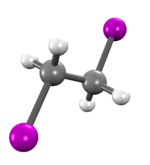1,2-Diiodoethane
| |||
| |||
| Names | |||
|---|---|---|---|
| IUPAC name
1,2-diiodoethane | |||
| Other names
ethylene iodide | |||
| Identifiers | |||
| 3D model (JSmol) |
|||
| ChemSpider | |||
| ECHA InfoCard | 100.009.872 | ||
| PubChem CID |
|||
| |||
| |||
| Properties | |||
| C2H4I2 | |||
| Molar mass | 281.86 g·mol−1 | ||
| Density | 2.13 g/cm3 | ||
| Melting point | 80 to 82 °C (176 to 180 °F; 353 to 355 K) | ||
| Except where otherwise noted, data are given for materials in their standard state (at 25 °C [77 °F], 100 kPa). | |||
| Infobox references | |||
1,2-Diiodoethane is an organoiodine compound.[1]
It is most commonly used in organic synthesis in the preparation of Samarium (II) Iodide or Ytterbium (II) Iodide in THF.[2]
Spectral properties
In mass spectroscopy, 1,2-diiodoethane exhibits 5 major peaks, with the base peak showing at 155 m/z, which is the loss of one iodide molecule of 126 g/mol.
Synthesis
1,2-Diiodoethane can be synthesized by bubbling ethene into pure liquid iodine at room temperature.
By formula: C2H4 + I2 = C2H4I2 [3]
References
- ↑ Buckingham, John (1990). Dictionary of Organic Compounds. 7. CRC Press. p. 2495. ISBN 9780412540905. Retrieved 5 January 2014.
- ↑ P. Girard, Jean-Louis Namy, Henri Kagan, Divalent Lanthanide Derivatives in Organic Synthesis. 1. Mild Preparation of SmI2 and YbI2 and Their Use as Reducing or Coupling Agents, J. Am. Chem. Soc., 1980, vol. 102(8), pp.2693–2698. (doi:10.1021/ja00528a029).
- ↑ H.Y. Afeefy, J.F. Liebman, and S.E. Stein, "Neutral Thermochemical Data" in NIST Chemistry WebBook, NIST Standard Reference Database Number 69, Eds. P.J. Linstrom and W.G. Mallard, National Institute of Standards and Technology, Gaithersburg MD, 20899,doi:10.18434/T4D303, (retrieved June 9, 2017).
This article is issued from
Wikipedia.
The text is licensed under Creative Commons - Attribution - Sharealike.
Additional terms may apply for the media files.



